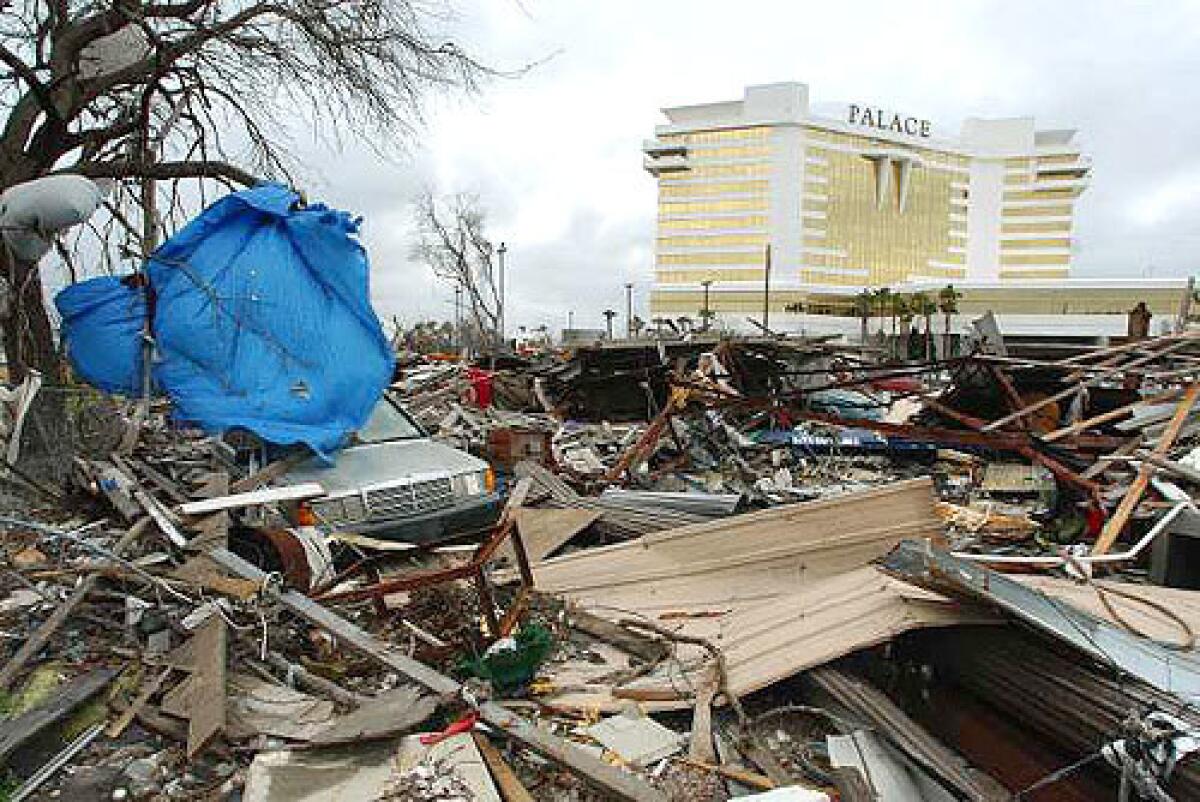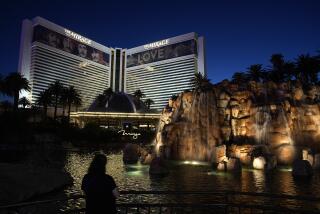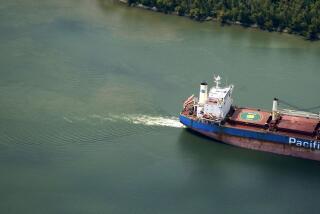Mississippi Casinos Trump Katrina

- Share via
BILOXI, Miss. — From the balconies of the Isle of Capri Casino, Mississippi’s once-glittering coastline spreads toward the horizon like an allegory of bad luck — a nightmare vision of heaped debris, buildings stripped to beams and traffic lights blinking on tilt.
But in the second-floor gambling parlor, an alternate, windowless reality is hermetically sealed from the devastation. The sound of power tools is drowned out by the incessant blooping of the slots. In here, nearly six months after the costliest natural disaster in U.S. history, the good times are rolling.
The gamblers are back, and they are bringing huge amounts of money to this beaten coastline’s most important industry.
FOR THE RECORD:
Mississippi casinos —A graphic in Saturday’s Section A on Mississippi’s recovering casino industry said Casino Magic in Biloxi planned to reopen within nine months. A decision on whether to reopen the casino has not been made.
“We’ve been here since morning, and I’ve already spent his $300,” said Christine Pitsos of Pensacola, Fla., nodding toward her fiance, Robert Call, after a day on the gaming floor.
“We wanted to come here and spend our money and help support the local economy,” Call said, straining to be heard above the din of the casino’s crowded restaurant.
Since its introduction in Mississippi in the early 1990s, casino gambling has transformed this stretch of the coast, often called the “Redneck Riviera,” from the object of regional jokes to a booming resort area. Then Hurricane Katrina struck on Aug. 29, destroying most of the waterfront casinos and shuttering the remainder. Some economists and tourism officials predicted that their comeback — if it occurred at all — would be slow going.
But the Isle of Capri and two other casinos resumed business in December, and since then have attracted thousands of visitors who have helped the gaming industry post surprisingly strong numbers. In January, the three casinos pulled in nearly $64 million in gross gaming revenue, according to the Mississippi Gaming Commission. The previous January, the total in Biloxi was $90 million — when the city had nine casinos in business.
State officials say a healthy casino industry is key to rebuilding the coast. But they’re surprised that so many visitors have returned so soon.
“We are just flabbergasted,” said Larry Gregory, executive director of the gaming commission. “It could be curiosity, or pent-up excitement from people who for several months have been unable to play. We do know that it’s an economic gold mine right now.”
Gambling has long been a contentious issue in Mississippi, and the debate over its legalization remains fierce. Supporters wanted their historically poor state to benefit from jobs and tax revenue that casinos could provide, but Christian conservatives fretted about the wages of sin.
So in 1990, the Legislature allowed casinos to open only on barges floating on the Mississippi River or in the Gulf of Mexico. The results were awkward and, some contend, ridiculous: Many of the gambling barges connected seamlessly with on-land hotels, and visitors were often unsure whether they were on the water or on land.
Despite the restrictions, the casinos became the region’s economic powerhouse, employing 17,000 workers. In fiscal year 2005, the state collected $99 million in tax revenue from the casinos.
The floating barges proved disastrous when Katrina struck. Some broke from their moorings and surged across coast-hugging U.S. Highway 90, crushing homes and other buildings.
In October, the Mississippi Legislature changed the law to allow onshore casinos within 800 feet of the shoreline. The casinos got another boost when Sen. Trent Lott (R-Miss.) helped them win federal tax relief to rebuild.
These changes helped persuade many of the large casino companies to return, said Frank J. Fahrenkopf Jr., president of the American Gaming Assn., a lobbying group.
Casinos including the Boomtown, Treasure Bay and Beau Rivage expect to reopen this year. Harrah’s, which had casinos in Biloxi and nearby Gulfport, plans to build two mega-resorts here and is selling the Gulfport property to a competitor.
Gaming industry officials have been further encouraged by the January receipts, Fahrenkopf said, because tourists came despite the devastation. Instead of beachside charm, they confront a landscape that one local official described as “carpet-bombed.”
Today, it’s also tough to find a room: Only 1,860 of the coast’s 8,500 hotel rooms are inhabitable.
Little remains of Biloxi’s oceanfront development. Isle of Capri visitors can walk a few hundred yards to the reopened Palace Casino Resort Hotel, or drive to the IP Hotel & Casino on Biloxi’s back bay. But other gaming houses remain gutted. Surrounding shops, houses and restaurants are mostly gone.
A few residents are back, housed in trailers amid the rubble and hulking, denuded oaks. The beachfront, littered with broken pilings, is eerily quiet.
At the Isle of Capri this week, hundreds of visitors packed the casino’s onshore gambling floor even in the early morning. They crowded the $100-a-hand blackjack table, basked in the glow of video slots and appeared unbothered by the “pardon our dust” signs and rebuilding crews.
During the storm surge, the casino’s 45,000-square-foot barge rose 25 to 30 feet, smashing into a corner of the parking garage. About two feet of water coursed through the first floor of the hotel, and the picture windows of its Farraddays’ restaurant were blown out by the winds.
But damage to the hotel was not as bad as it was at most others, and for months the Isle of Capri served as a home to rescue and reconstruction crews.
The reopened casino had been hastily renovated; officials say that more permanent changes are in the works. The onshore gambling area was installed on the former site of the hotel’s conference rooms. Only 525 of the 750 hotel rooms are available, and front desk employees say those are booked solid most nights.
The patrons are a curious mix.
Some, like Call and Pitsos, have been coming to the coast for years and wanted to find out what was left. “Tomorrow we’re going to get up and go see what we used to see,” Pitsos said. “It’s really sad, actually.”
Wayne Hardin, a financial advisor from Griffin, Ga., helped arrange a gambling outing for 60 men, many of whom had been making the trip here since the late 1990s. They decided to return to help employees they had come to know. Hardin said that everybody was trying to give bigger tips than usual.
“We said, ‘It does look like hell down there, but we know these people,’ ” said Hardin, 57. “They’re here working and dressed up nice, but we don’t know what they go home to — trailers or tents or whatever.”
Rich Westfall, the Isle of Capri’s community development director, said the biggest challenges facing the industry were damaged infrastructure and lack of housing. The Isle of Capri is back to pre-Katrina staffing levels, employing about 1,200 of the 4,000 now working in the casinos. Westfall estimates that half of the Isle of Capri’s employees are living in temporary housing.
Locals make up about 20% of the Isle of Capri’s post-Katrina gamblers. Arlethia Fairley, an unemployed cafeteria worker, sat impassively one night in front of a slot machine called “Richville USA,” pressing a button and watching it eat into the $150 credit she had deposited.
Fairley’s apartment in Gulfport was destroyed, and she’s living here with her daughter and collecting unemployment. She was bored. “You just have to find stuff to do unless you want to sit around the house all day,” said Fairley, 36.
Across the street at the Palace, coast resident Shannon McNatt described the ups and downs of a life tied to the casino business — and the vicissitudes of the Gulf weather.
Before Katrina, McNatt, 35, was making good money as a waitress at a casino. The storm ruined her rented house in D’Iberville and washed away her job. She moved into a federally provided trailer with her disabled husband and three children, and found work at a roadside diner that didn’t pay as well.
McNatt says she is waiting for more casinos to open so she can get a better waitress job. Earlier this week, she was at the Palace, but as a customer trying her luck on the slots.
*
(BEGIN TEXT OF INFOBOX)
On a roll
Mississippi’s casino industry is on the path to recovery after being hit hard by Hurricane Katrina. Here’s where things stand for gamblers on the Mississippi coast:
In Biloxi
1. Imperial Palace- Open; construction continues
2. Boomtown Casino - Plans to open in six months
3. Palace Casino Resort - Open; plans to open a golf course in the spring
4. Isle of Capri Casino Resort - Open; construction continues
5. Casino Magic - Plans to open within nine months
6. Hard Rock Hotel and Casino* - Plans on hold
7. Grand Casino Biloxi - Plans to build two new casinos; timetable uncertain
8. Beau Rivage Resort & Casino - Hoping to open by storm anniversary in August; planning to add a golf course
9. Treasure Bay Casino Resort - Plans to open in September
10. President Casino - Was going to move but was destroyed by Katrina
In Gulfport
11. Copa Casino - Closed; timetable uncertain
12. Grand Casino Gulfport - In sale negotiations
*The Hard Rock was about to open when Katrina destroyed it.
-
Sources: City of Biloxi, American Gaming Assn.
Graphics reporting by Tom Reinken
More to Read
Sign up for Essential California
The most important California stories and recommendations in your inbox every morning.
You may occasionally receive promotional content from the Los Angeles Times.













